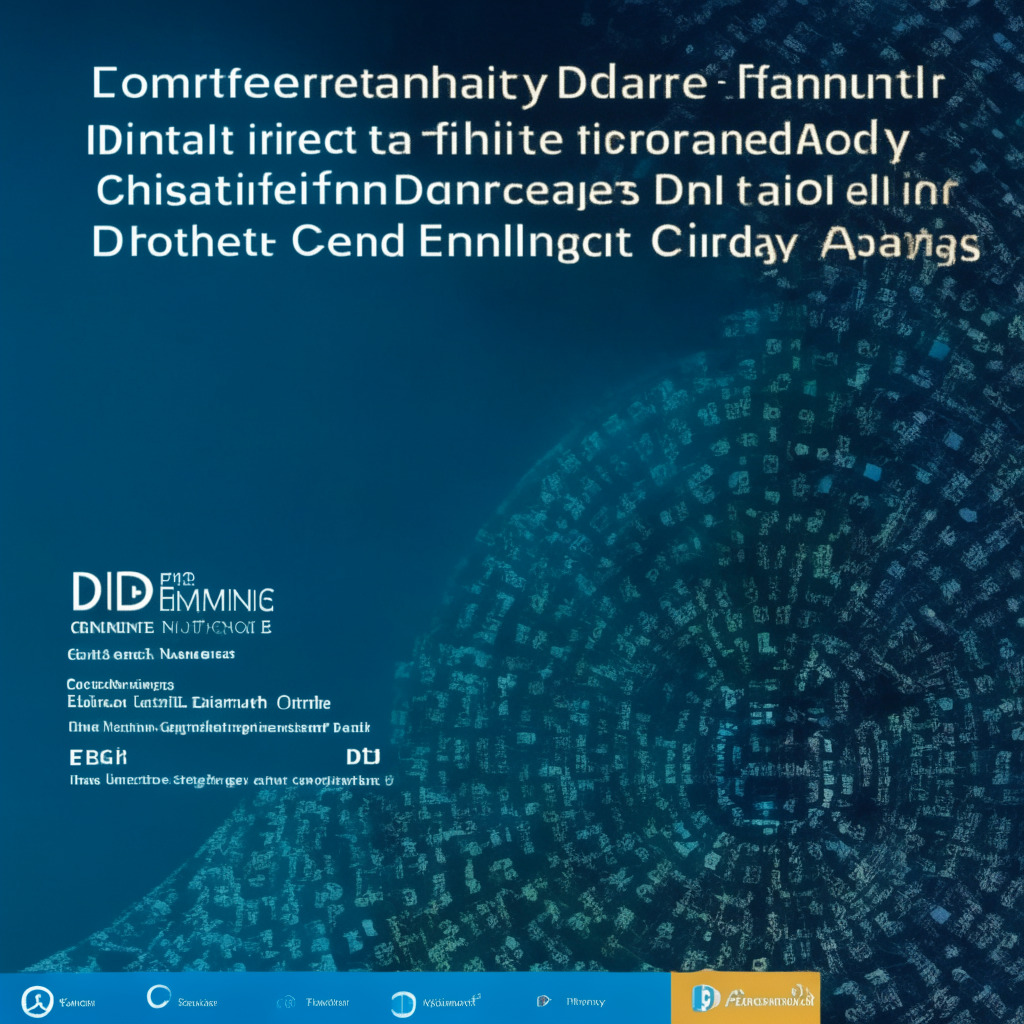In the midst of global economic uncertainty, gold’s reliability shines while a gold token, XAUT, experiences a market rise implying a bullish sentiment. Emerging prospects like the TG.Casino, a GambleFi project, blending blockchain’s decentralised advantages with casino gaming, are gaining traction.
Search Results for: Financial Times
Geopolitical Tensions: Unpredictable Influence on Financial Assets and the Crypto Market
“The escalating tensions between Israel and Hamas are affecting global financial markets, causing a decline in emerging stocks and cryptocurrencies, and a surprising uptick in traditional safe havens like oil and precious metals. Amid this turmoil, global economies are grappling with high oil prices and inflationary pressure, while the long-term effects are yet to be seen.”
Federal Reserve Concerns: Stablecoins’ Instability or the Next Financial Evolution?
“Federal Reserve Banks express concern that stablecoins could introduce instability into the financial system due to lack of standard regulatory framework. The Central Bank of Italy reinforces stablecoins’ unstability and presses for international regulatory body to govern cryptocurrencies. Despite risks, blockchain-based cross-border payments show promise of cost-effective solutions.”
Navigating the Crypto Winter: A Professional Responsibility for Financial Advisors
Despite volatility and what’s known as a “crypto winter”, financial advisors need a clear awareness of cryptocurrency risks and benefits according to Noah Billick from Rennoco & Co. Advisors failing to comprehend crypto’s potential role in a client’s portfolio risk neglecting their fiduciary duties. Additionally, the crypto industry is steadily progressing, with improved custodial practices and regulatory developments leading the way.
Zimbabwe’s Launch of Gold-Backed Digital Tokens: A Bold Move in Turbulent Economic Times
Zimbabwe’s central bank is contemplating the introduction of gold-backed digital tokens (GBDT) for retail transactions as an alternative to the heavily relied upon US dollar. The GBDTs are backed by physical gold reserves and offer divisibility, making them more convenient and value-preserving. These could potentially help in combating the crippling inflation rate and provide a base for a future central bank digital currency ecosystem.
Fueling Interest in Cryptocurrencies: Examining Germany’s Financial Slump and Its Potential Windfall for Blockchain
“Germany’s economic slump potentially fuels interest in cryptocurrencies. Its weakened manufacturing industry and dwindling surplus pose dangers, which could further destabilise the Euro and the European Central Bank. This weakening could encourage cryptocurrency adoption, even as the US dollar remains strong.”
Myanmar’s First Cryptocurrency Bank: A Revolutionary Leap towards Financial Liberty
Myanmar is set to launch its first institution operating solely on cryptocurrency, the Spring Development Bank, aiming to facilitate smoother cross-border transactions. Constructed on the Polygon network, this financial platform leverages blockchain technology for global accessibility, combating international transfer fees with the deployment of stablecoins.
Bitso and Stellar: Unleashing Financial Freedom or Inviting Cyber Threats?
“Latin American crypto exchange, Bitso, partners with Stellar’s Anchor Network to facilitate global trade in USDC across Argentina, Colombia, and Mexico. While such a partnership signals major progress, it equally amplifies concerns about market fluctuations, security vulnerabilities and potential for money laundering within the transnational operations of crypto exchanges.”
Digital Pound Dilemma: Treading the Path Between Financial Innovation and Privacy Concerns
“The UK’s proposal for a Central Bank Digital Currency (CBDC), the ‘Britcoin’, met with public criticism due to privacy and stability concerns. Critics also suggest the CBDC could destabilise commercial banks during a crisis. Conversely, some see state-issued digital currencies as a path to financial inclusion, and argue that privacy can be maintained through appropriate design and regulations.”
Navigating Crypto Volatility and Economic Optimism in a Changing Financial Landscape
“Bitcoin and other digital assets’ responses to global financial changes highlight a likely significant surge by 2023. Notable financial giants are entering the Bitcoin ETF sphere, triggering fluctuations. Amid worldwide central bank interventions and a potential influx of traditional firms, even in bear market conditions, there’s a burgeoning acceptance of crypto in mainstream finance.”
Crypto Integration: Financial Giants Boost Legitimacy & Market Growth Amid Regulatory Concerns
Bitcoin recently broke the $30,000 mark, with traditional finance firms showing renewed interest in crypto. Major finance institutions like BlackRock, Invesco, and WisdomTree have filed applications for bitcoin ETFs, and the launch of EDX crypto exchange, backed by Fidelity Digital Assets, Charles Schwab, and Citadel Securities, expands the market with four new tokens. As traditional finance and crypto worlds strengthen their ties, a balanced approach to regulation is essential.
Skipping Interest Rate Hike: Economic Savior or Catastrophe? Crypto’s Role in Financial Turmoil
Federal Reserve Chairman Jerome Powell opts to “skip” a round of rising interest rates amid mixed reactions. As inflation reaches a 40-year high and citizens report higher living costs, some analysts believe the decision might do more harm than good. This scenario also highlights the varying roles and adoption of cryptocurrencies across different countries.
Depegging Dilemma: Tether’s Turbulent Times Amid Loan Saga and NYAG Revelations
The depegging of stablecoin Tether (USDT) is linked to the loan saga on DeFi platform Curve. Tether Holdings Ltd reveals concerns over sensitive commercial information shared by the Office of the New York Attorney General to Coindesk. The crypto community now fears potential implications from the released documents.
Balancing Financial Security and Privacy: The Tornado Cash Sanctions Debate
The Blockchain Association supports Coin Center’s lawsuit against the US Treasury over its sanctions against Tornado Cash, arguing that the sanction raises regulatory and constitutional concerns. The case outcome could set a precedent for privacy-protecting services in the digital asset industry, emphasizing the need to balance financial security and individual privacy.
Animoca Brands’ Financial Report Delay: A Sign of Trouble or Valid Concern?
Animoca Brands faces scrutiny as it continues to delay publishing its 2020 audited financial report. Citing market turbulence in 2021 and 2022, the company’s private auditors seek to incorporate the impact of fluctuating investments before finalizing the report. Concerns arise over potential reputational effects and eroding stakeholder confidence.
Debt Ceiling Crisis 2023: Turning to Bitcoin and Gold for Financial Protection
Robert Kiyosaki emphasizes his belief in purchasing gold and Bitcoin amid looming debt ceiling talks and market restrictions making traditional financial assets risky. Kiyosaki advocates for acquiring gold, silver, and Bitcoin as safeguards against a ‘crash landing’ situation.
Digital Yuan’s Impact on Chinese Financial Landscape: Pros, Cons, and Debates
China’s financial service providers now allow citizens to pay for wealth products using the digital yuan, marking a significant milestone for the nation’s CBDC. The China Securities Regulatory Commission has approved the first application scenario for the digital yuan in the securities market, enabling investors to purchase public funds and financial products with the CBDC.
US Bank Mergers: Solving the Crisis or Creating Riskier Financial Giants? Debating Pros and Cons
US Treasury Secretary Janet Yellen discussed the possibility of more bank mergers amid the ongoing banking crisis. However, concerns arise over the growing power of financial giants, potentially posing a threat to Americans and the economy. The delicate balance between ensuring stability and preventing “too big to fail” institutions remains a challenge.
G7 Summit, Biden’s Disapproval & Crypto: Debating Tax & Regulation in Uncertain Times
During the G7 summit, President Biden criticized a debt deal for protecting wealthy tax cheats and crypto traders, while US Treasury Secretary Janet Yellen warned of catastrophic consequences if an agreement isn’t reached. This highlights ongoing tensions between supporting the expanding crypto market and ensuring fair responsibility, as the US debt ceiling deadline approaches and the future of crypto regulation remains uncertain.
Financializing Carbon Credits: Blockchain’s Role in Mangrove Restoration Projects
Solid World has launched the first forward carbon assets pool on the blockchain using Polygon, aiming to revolutionize carbon credit project financing by enabling pre-selling future credits. Focusing on mangrove restoration, this liquidity pool combines AI-powered risk assessment with forward contracts, facilitating funding for climate-positive projects while addressing potential drawbacks like energy consumption.
Banking Crisis Fears Boost Crypto Markets: Balancing Innovation and Financial Security
Amid the potential US regional banking crisis, the uncertainty in the banking sector has proven to be bullish for Bitcoin prices. The rise of cryptocurrencies and decentralized finance offers potential solutions to traditional banking challenges during times of economic uncertainty while also prompting concerns and striking a balance between innovation and security.
Worldcoin’s Ambitions: Global Financial Revolution or Just Another Crypto Cash Grab?
OpenAI’s Sam Altman is pushing to secure $100 million in funding for Worldcoin, a project aimed at creating a collectively owned, globally distributed cryptocurrency. With supporters touting its potential for financial inclusivity, skeptics question its real-world value and potential risks.
Animoca Brands’ Financial Success: Can They Sustain Growth in Uncertain NFT Market?
Hong Kong-based Animoca Brands boasts a strong financial position, holding $194 million in stablecoin reserve and $566 million in liquid digital assets as of April 30, 2023. The company experienced significant growth in 2021 and continues to actively seek opportunities in gaming and the metaverse.
Animoca Brands’ Financial Growth: A Rising Force in NFTs, Gaming, and Metaverse
Hong Kong-based Animoca Brands is in a financially strong position with $194 million in stablecoin reserves and $566 million in liquid digital assets. The company’s incomes surged from $148 million in Q4 2021 to $573 million in Q1 2022, driven by NFT and token sales. Despite challenges, Animoca Brands’ resilience and growing acceptance of blockchain technology reflect its commitment to advancing digital property rights and entertainment.
Banking Turmoil’s Impact on Crypto: Navigating Market Volatility Amid Uncertain Times
Bitcoin dips below $27,000 amid recent banking turmoil, highlighting the significance of investor sentiments in driving market fluctuations. Cryptocurrency fluctuations demonstrate the interconnected nature of traditional banking systems and digital assets, making understanding these connections crucial for investors navigating the complex world of cryptocurrencies and blockchain technology.
Declining Trust in Banks: Will Crypto Emerge as Safer Alternative Amid Financial Turmoil?
A recent Gallup poll reveals that 48% of respondents in the US are concerned about their money in banks, with 20% being “very concerned.” In the context of the US banking system’s challenges, it remains to be seen if cryptocurrencies can emerge as a more stable and secure alternative for consumer finances.
Crypto Resilience Amid Fed Rate Hikes: Decoupling from Traditional Financial Markets?
The crypto market has shown remarkable resilience despite the Federal Reserve’s recent interest rate hike, with its market cap reaching $1.20 trillion. Cryptocurrencies may further decouple from traditional financial markets, as they develop increased immunity to macroeconomic uncertainties and exhibit long-term potential.
Cryptocurrencies as Centerpieces of Crime: Pros, Cons, and Combating the Threat
The DOJ’s National Cryptocurrency Enforcement Team (NCET) director, Eun Young Choi, highlights that cryptocurrencies are permeating every aspect of criminal activity. At a recent Financial Times conference, panelists emphasized the need for new strategies, international cooperation, and public-private partnerships to enhance safety and security in the crypto space.
Debating Anonymity in Digital Pounds: CBDCs vs Cryptocurrencies in the UK
At a recent Financial Times Cryptocurrency and Digital Assets Summit, Tom Mutton, the Bank of England’s head of fintech, discussed the UK’s plans for a central bank digital currency (CBDC) focusing on privacy and anonymity. While emphasizing privacy, Mutton stated that anonymity would not be intended for the digital pound and it would not be interoperable with cryptocurrencies. The Bank of England’s approach raises questions on the role of anonymity, privacy, and interoperability in the financial ecosystem.
Dwindling Dominance: Binance Market Share’s Alarming Plunge amidst Regulatory Heat
“Binance, a major player in the crypto space, has seen a notable decline in market share among non-dollar crypto exchanges. Co-founder, Yi He, has urged employees to focus on product conceptualization and improving client experiences, disregarding regulatory pressures and competitors’ expansions.”
Unveiling the Privacy vs Transparency Tug-of-War in Bankruptcy Proceedings: FTX Trading Case Study
This excerpt explains the clash between respected media houses and FTX Trading Ltd. over the redaction of customer data in bankruptcy proceedings. Media organizations argue for transparency while FTX and the Creditors Committee favor privacy, shaping the way customer data is handled in future bankruptcy cases.
Navigating Cryptocurrency Roadblocks: Singapore’s Regulatory Approach and the FinTech Sandbox Dilemma
“The Monetary Authority of Singapore (MAS) announced no businesses qualified as cryptocurrency payment providers under the FinTech Regulatory Sandbox. MAS is cautious about adopting payment innovations and emphasizes a need for crypto businesses to demonstrate robust Anti-Money Laundering controls.”































